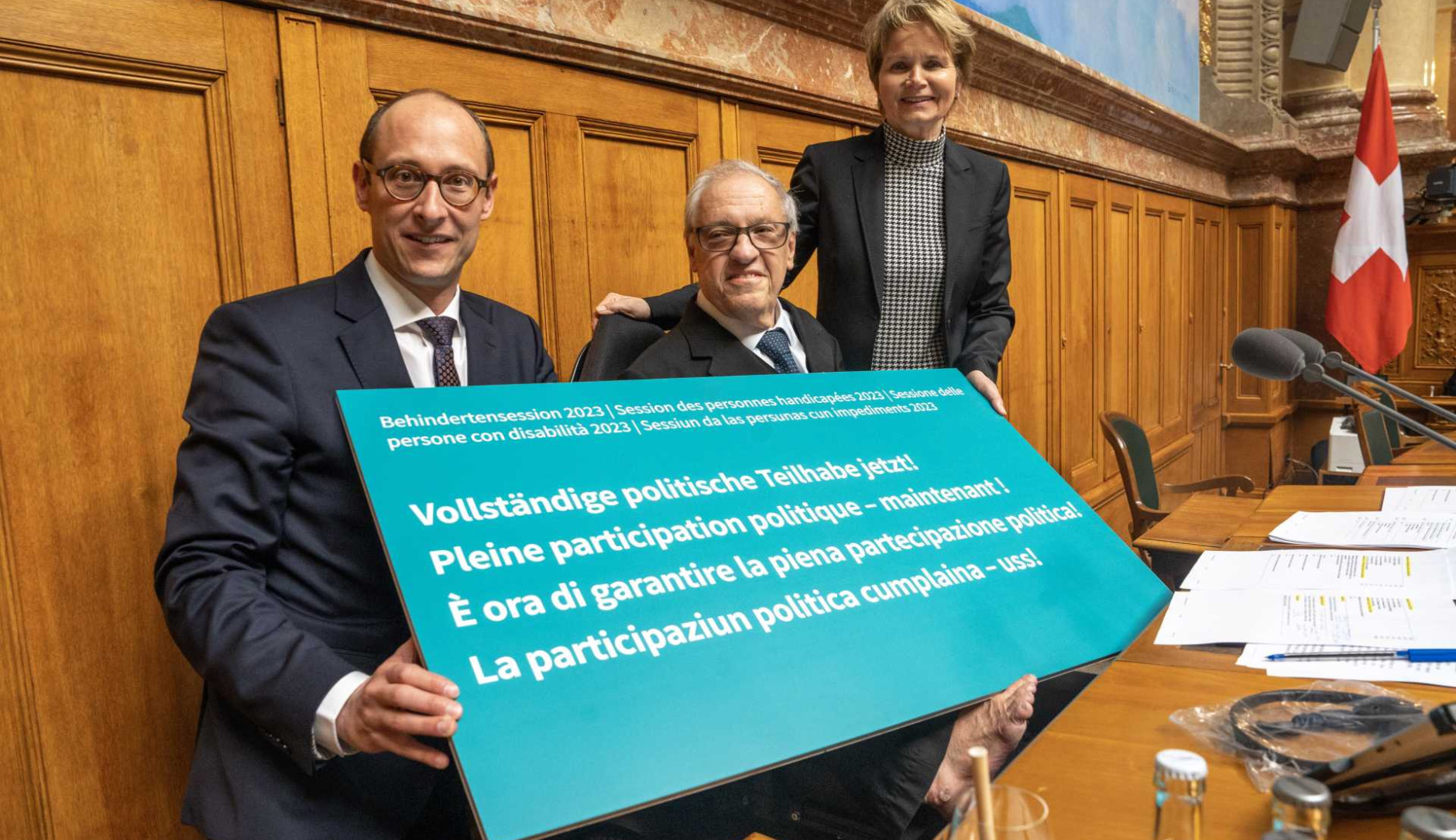Switzerland’s first “Session of persons with disabilities”
The first "session of people with disabilities" took place in the Swiss National Council. 44 representatives called for more political participation and accessibility.

The very first "Session of Persons with Disabilities" took place in the afternoon of Friday, March 24, 2023 in the hall of the Swiss National Council in the Federal Palace in Bern. This session was live streamed, simultaneously translated into the respective sign languages, and was also captioned.
44 persons with disabilities from all Switzerland gathered, who had previously been elected by a single vote on the website of Pro Infirmis, one of the leading organisations when it comes to inclusion and equality of persons with disabilities in Switzerland. These 44 elected representatives out of 200 seats to assign in the National Council represent the share of all persons with disabilities living in Swiss society, which stands at around 22 %.
Albeit a rather concise and strict agenda to follow, they – lead by National Councillor Christian Lohr (The Centre, from the canton of Thurgau), himself being affected by a physical disability through thalidomide, and in presence of the current Speaker of the National Council, Martin Candinas (The Centre), and the Speaker of the Council of States, Brigitte Häberli-Koller (The Centre) – adopted a resolution to the Federal Assembly to demand the following (Full statement by Pro Infirmis here):
"We demand to be able to exercise our right to vote and elect autonomously and without hindrance. No one shall be deprived of this right because of a disability. The Confederation, cantons and municipalities guarantee that all persons with disabilities have access to all information and that the election and voting process is autonomous and free of obstacles."
"We demand self-determination and equal participation in political life. The Confederation, cantons, municipalities, but also the political parties and political organisers commit themselves to making their events, procedures, buildings, services, documents and information accessible to all persons with disabilities, to making public funds available for this purpose and to stand up against ableism."
"We demand better direct representation of people with disabilities at all political levels – from the municipal council to the Federal Council. The Confederation, cantons, municipalities and political parties commit to achieving this goal through measures of support, encouragement and financial compensation for disadvantages. The state shall guarantee that people will receive the same social benefits after leaving political office as before."
"We demand to be heard and to have a say in all political decisions. To this end, all standing commissions at all levels of government designate persons with disabilities as experts and consult them. In addition, an extra-parliamentary commission for people with disabilities will be created at the national level."
"We call on our fellow campaigners, the 1.8 million people with disabilities, to become active, to network and to become politically involved at all levels. In doing so, it is important to continue to point out existing obstacles and to fight for their place in politics."
"We call on organisations of and for people with disabilities to act as role models. They commit themselves to staffing their strategic and operational bodies with persons with disabilities, to letting them participate autonomously and without barriers, and to working together with them for full political participation."
"We demand that people with disabilities are not measured by certain abilities and reduced to their disabilities. According to fundamental law, all people are equal and should not be treated unequally and stereotyped."
"We demand that this first disability session will not be the last. We still have a lot to say and to contribute."
In Switzerland, there are citizens living under the so-called "comprehensive guardianship" mostly because of psychological or cognitive disabilities. In the vast majority of cantons and on the federal level they are excluded from participating in politics (directly and indirectly).
This has to stop, especially for a country that takes huge pride in its democratic traditions, its diversity, and is one of the longest existing and uninterrupted democracies in the world.
The greatest hindrances to political participation on an equal footing are the lacking of accessibility to and in buildings of parties, local, cantonal or federal governments and parliaments, to event venues, i.e. rallies, to information or for the holding and execution of offices if elected, and linguistic and communicative obstacles (like no sign language and easy-to-read translations, no subtitles, poorly designed and accessible websites, and contents of social media channels). Accessibility is either not at all or only partially given.
If there are elected politicians with disabilities, some will risk their "invalidity" pension or their access to supplementary benefits ("Ergänzungsleistungen" in German) during their term of office and would have to reapply thereafter.
According to the resolution and because of the insufficient participation of persons with disabilities, the review of the country report by the UN Committee on the Rights of Persons with Disability, which has its statutory right to observe the situation of persons with disabilities in Switzerland due to the ratification of the Convention on the Rights of Persons with Disabilities in April 2014, found serious shortcomings in all areas of life, but especially in the accessibility of public transport (bus stops and train stations) which must be accessible until the end of 2023, according to the Federal Disability Equality Act FDEA, in the accessibility of buildings or in the funding of sheltered workshops for persons with disabilities and nursing homes that hinders participation in society and in the economy, or the fact that Switzerland is labelling persons with disabilities as "invalid" (null and void) or as "helpless" (see "helplessness allowance") in its social security system.
Volt Switzerland is keen to achieve these demands from the resolution and to work hard on them, because they are at the core of Volt's progressive, equating, and inclusive values. Together we are fighting across Europe for a fairer society where all people can fulfil their potential.
Images were provided by Pro Infirmis.